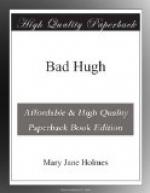“Why didn’t I?” and John started to his feet; then he continued: “Anna, I tell you there’s a heap of wrong for somebody to answer for, but it is not you, and it is not me—it’s—it’s mother!” and John whispered the word, as if fearful lest the proud, overbearing woman should hear.
“You are mistaken,” Anna replied, “for as far as Charlie was concerned father had more to do with it than mother. I’ve never seen him since. He did marry another, but I’ve never quite believed that he forgot me.”
Anna was talking now more to herself than to John, and Charlie, could he have seen her, would have said she was not far from the narrow way which leadeth unto life. To John her white face, irradiated with gleams of the soft firelight, was as the face of an angel, and for a time he kept silence before her, then suddenly exclaimed:
“Anna, you are good, and so was she, so good, so pure, so artless, and that made it hard to leave her, to give her up. Anna, do you know what my mother wrote me? Listen, while I tell, then see if she is not to blame. She cruelly reminded me that by my father’s will all of us, save you, were wholly dependent upon her, and said the moment I threw myself away upon a low, vulgar, penniless girl, that moment she’d cast me off, and I might earn my bread and hers as best I could. She said, too, my sisters, Anna and all, sanctioned what she wrote, and your opinion had more weight than all the rest.”
“Oh, John, mother could not have so misconstrued my words. Surely my note explained—I sent one in mother’s letter.”
“It never reached me,” John said, while Anna sighed at this proof of her mother’s treachery.
Always conciliatory, however, she soon remarked:
“You are sole male heir to the Richards name. Mother’s heart and pride are bound up in you. A poor, unknown girl would only add to our expenses, and not help you in the least. What was her name? I’ve never heard.”
John hesitated, then answered: “I called her Lily, she was so fair and pure.”
Anna was never in the least suspicious, but took all things for granted, so now she thought within herself, “Lilian, most likely.” Then she said: “You were not engaged to her, were you?”
John started forward, and gazed into his sister’s face with an expression as if he wished she would question him more closely, but Anna never dreamed of a secret, and seeing him hesitate, she said:
“You need not tell me unless you like. I only thought, maybe, you and Lily were not engaged.”
“We were. Anna, I’m a wretch—a miserable wretch, and have scarcely known an hour’s peace since I left her.”
“Was there a scene?” Anna asked; and John replied:
“Worse than that. Worse for her. She did not know I was going till I was gone. I wrote to her from Paris, for I could not meet her face and tell her how mean I was. I’ve thought of her so much, and when I landed in New York I went at once to find her, or at least to inquire, hoping she’d forgotten me. The beldame who kept the place was not the same with whom I had left Lily, but she know about her, and told me she died with cholera last September. She and—oh, Lily, Lily—” and hiding his face in Anna’s lap, John Richards, whom we have only seen as a traveled dandy, sobbed like a little child.




